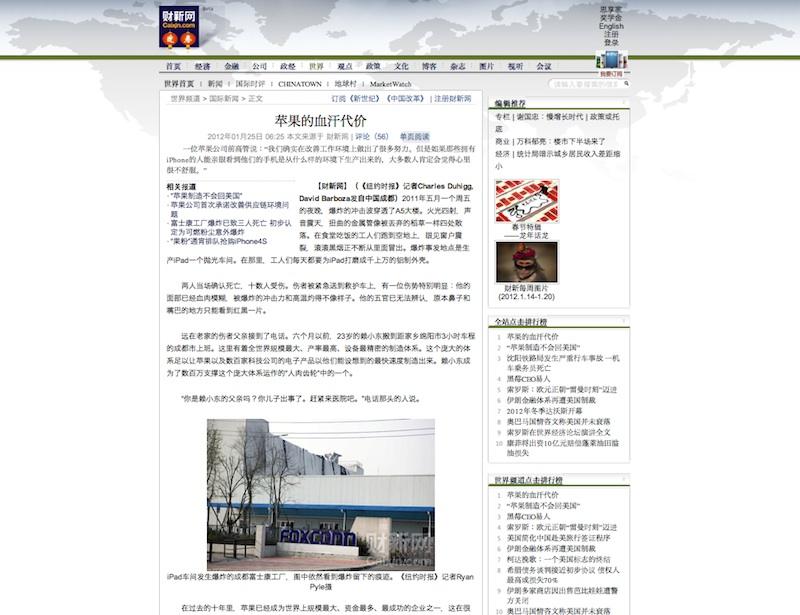The original story, titled "In China, Human Costs Are Built Into an iPad," was republished yesterday (below) by the Chinese-language Caixin business magazine, headquartered in Beijing.
The New York Times obtained comments posted on the Caixin web site, Weibo.com and other social media in China and translated them. It published a series of responses on its "The Lede" blog, which got relatively little exposure.
Chinese on Apple in China
Among the comments New York Times translated for publication: "If people saw what kind of life workers lived before they found a job at Foxconn, they would come to an opposite conclusion of this story: that Apple is such a philanthropist," wrote Zhengchu1982.
"If the story is simply blaming Apple and Foxconn, then it is simplifying the problem. Other companies including HTC, Lenovo, HP and Sony, and their OEM (original equipment manufacturer) companies such as Wistron, Quanta and Inventec, share the same situation. Workers of small OEM enterprises are working in even harsher environments and having more overtime. The root is that they are unable to reach a higher position in the industry chain. Also, there are no effective labor organizations in those factories and the government tends to shield huge companies because of their profits," wrote a user in comment on weibo.com.
"It is biased to blame Apple for everything. The government should supervise the companies and their conduct, not the other way around. It is natural for enterprises to pursue economic profits. But corporate social responsibility needs to be backed up and monitored by regulations and laws," posted ChouzhuDaddy.
"If more rigorous labor protection standards and 8-5 working time protocol are being strictly executed, we can expect a plunge of the workers’ wages. If labor organizations with monopoly rights are established, those rural migrant workers who cannot find a position in the organization will be forced back to their hopeless villages. Manufacturing costs in China will increase in other ways and therefore harm its competitive advantage. Under such conditions, huge companies and advocates get to harvest their reputation and sense of achievement, but who else will get the real profit?" wrote YeyeGem.
"If not to buy Apple, what’s the substitute – Samsung? Don’t you know that Samsung’s products are from its OEM factory in Tianjin? Samsung workers’ income and benefits are even worse than those at Foxconn. If not to buy iPad – (do you think) I will buy Android Pad? Have you ever been to the OEM factories for Lenovo and ASUS? Quanta, Compaq … factories of other companies are all worse than those for Apple. Not to buy iPod – (do you think) I will buy Aigo, Meizu? Do you know that Aigo’s Shenzhen factory will not pay their workers until the 19th of the second month? If you were to quit, fine, I’m sorry, your salary will be withdrawn. Foxconn never dares to do such things. First, their profit margin is higher than peers as they manufacture for Apple. Second, at least those foreign devils will regularly audit factories. Domestic brands will never care if workers live or die. I am not speaking for Foxconn. I am just speaking as an insider of this industry, and telling you some disturbing truth," another users wrote a comment posted by Caixin.
A variety of other comments were published by The Lede," some blaming Apple while many blamed the local government. Others expressed an opinion along the lines of Zhou Zhimei, who wrote, "By the way, construction workers and farmers are also living a harsh life in China, shall we also boycott housing and grains?"
Apple's chief executive Tim Cook has reportedly responded to the New York Times article, writing to employees that "Any accident is deeply troubling, and any issue with working conditions is cause for concern. Any suggestion that we don’t care is patently false and offensive to us. As you know better than anyone, accusations like these are contrary to our values. It’s not who we are."
 Daniel Eran Dilger
Daniel Eran Dilger

-m.jpg)






 William Gallagher
William Gallagher
 Thomas Sibilly
Thomas Sibilly
 Andrew O'Hara
Andrew O'Hara
 Amber Neely
Amber Neely
 Marko Zivkovic
Marko Zivkovic
 Malcolm Owen
Malcolm Owen
 William Gallagher and Mike Wuerthele
William Gallagher and Mike Wuerthele










50 Comments
Interesting. I wonder what the "Apple is guilty of crimes against humanity" crowd will say. I await their manifesto against the windmills.
WOW, that was quick. Tim didn't need to take the time to draft his letter after all.
Foreign devils, lol.
All businesses need more government involvement.
New York Times is akin to the UK's Guardian. A bullshit publication for pseudo intellectuals. I have it on permanent ignore.